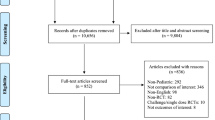Abstract
In this review, an evidence-based medicine approach to diagnosis and treatment for allergic rhinitis is reviewed. We performed a search of the medical literature for randomized, placebo-controlled trials of nonsedating antihistamines, intranasal corticosteroids, montelukast, azelastine, allergen immunotherapy, and anti-IgE. The mean numbers needed to treat were: nonsedating antihistamines—15.2; nasal corticosteroids—4.4; montelukast—14.3; azelastine—5.0; allergen immunotherapy—4.6; and anti-IgE—12.4. Treatment thresholds for use were: antihistamines—23%; nasal corticosteroids —8%; azelastine—16%; montelukast—8%; anti-IgE—50%; and immunotherapy—25%. When used appropriately, this information could become very useful for clinicians, particularly if cost, convenience, and other indirect factors can be included.
Similar content being viewed by others
References and Recommended Reading
Sackett D, Straus S, Richardson W, et al.: Evidence-Based Medicine: How to Practice and Teach EBM, edn 2. Toronto, Canada: Churchill Livingstone; 2000. This excellent reference provides an easy-to-follow introduction to the principles of evidence-based medicine. The principles of NNT and NNH are described extensively.
Sly RM: Epidemiology of allergic rhinitis. Clin Rev Allergy Immunol 2002, 22:67–103.
Williams P, Ahlstedt S, Barnes J, et al.: Are our impressions of allergy test performances correct? Ann Allergy Asthma Immunol 2003, 91:26–33.
Nelson HS, Oppenheimer J, Buchmeier A, et al.: An assessment of the role of intradermal skin testing in the diagnosis of clinically relevant allergy to timothy grass. J Allergy Clin Immunol 1996, 97:1193–1201. This study evaluated the performance characteristics of history, and prick and intracutaneous tests for diagnosing allergy to timothy pollen. Nasal challenge was used as a "gold" standard.
Petersson G, Dreborg S, Ingestad R: Clinical history, skin prick test and RAST in the diagnosis of birch and timothy pollinosis. Allergy 1986, 41:398–407.
Gendo K, Larson EB: Evidence-based diagnostic strategies for evaluating suspected allergic rhinitis. Ann Intern Med 2004, 140:278–289. This is a comprehensive analysis of performance characteristics for various diagnostic tests used in allergy.
Bent S, Friedland D: Treatment and testing thresholds. In Evidence-Based Medicine: A Framework for Clinical Practice. Edited by Friedland D, Go A, Davoren J, et al. Stamford, CT: Appleton and Lange; 1998:59–83.
Portnoy J, Simon S: Is 3-mm less drowsiness important? Ann Allergy Asthma Immunol 2003, 91:324–325.
Hepner M, Ownby D, MacKechnic H, et al.: The safety of immunotherapy: a prospective study. J Allergy Clin Immunol 1987, 97:133.
Day J, Briscoe M, Widitz M: Cetirizine, loratadine, or placebo in subjects with seasonal allergic rhinitis: effects after controlled ragweed pollen challenge in an environmental exposure unit. J Allergy Clin Immunol 1998, 101:638–645.
Wahn U, Meltzer E, Finn A: Fexofenadine is efficacious and safe in children with seasonal allergic rhinitis. J Allergy Clin Immunol 2003:763–769.
Berger W, White M: Efficacy of azelastine nasal spray in patients with an unsatisfactory response to loratidine. Ann Allergy Asthma Immunol 2003, 91:205–211.
Munk Z, LaForce C, Furst J, et al.: Efficacy and safety of triamcinolone acetonide aqueous nasal spray in patients with seasonal allergic rhinitis. Ann Allergy Asthma Immunol 1996, 77:277–281.
Ratner P, Howland W, Arastu R, et al.: Fluticasone propionate aqueous nasal spray provided significantly greater improvement in daytime and nighttime nasal symptoms of seasonal allergic rhinitis compared with montelukast. Ann Allergy Asthma Immunol 2003, 90:536–542.
Fokkens W, Cserhati E, dos Santos J, et al.: Budesonide aqueous nasal spray is an effective treatment in children with perennial allergic rhinitis, with an onset of action within 12 hours. Ann Allergy Asthma Immunol 2002, 89:279–284.
Lumry W: A review of the preclinical and clinical data of newer intranasal steroids used in the treatment of allergic rhinitis. J Allergy Clin Immunol 1999, 104:150–158.
LaForce C, Dockhorn R, Prenner BM, et al.: Safety and efficacy of azelastine nasal spray (Astelin NS) for seasonal allergic rhinitis: a 4-week comparative multicenter trial. Ann Allergy Asthma Immunol 1996, 76:181–188.
Chervinsky P, Casale T, Townley R, et al.: Omalizumab, an anti-IgE antibody, in the treatment of adults and adolescents with perennial allergic rhinitis. Ann Allergy Asthma Immunol 2003, 91:160–167.
Walker S, Pajno G, Lima M, et al.: Grass pollen immunotherapy for seasonal rhinitis and asthma: a randomized, controlled trial. J Allergy Clin Immunol 2001, 107:87–93.
Karaayvaz M, Erel F, Caliskaner Z, Ozanguc N: Systemic reactions due to allergen immunotherapy. J Investig Allergol Clin Immunol 1999, 9:39–44.
Author information
Authors and Affiliations
Rights and permissions
About this article
Cite this article
Portnoy, J.M., Van Osdol, T. & Williams, P.B. Evidence-based strategies for treatment of allergic rhinitis. Curr Allergy Asthma Rep 4, 439–446 (2004). https://doi.org/10.1007/s11882-004-0009-1
Issue Date:
DOI: https://doi.org/10.1007/s11882-004-0009-1




